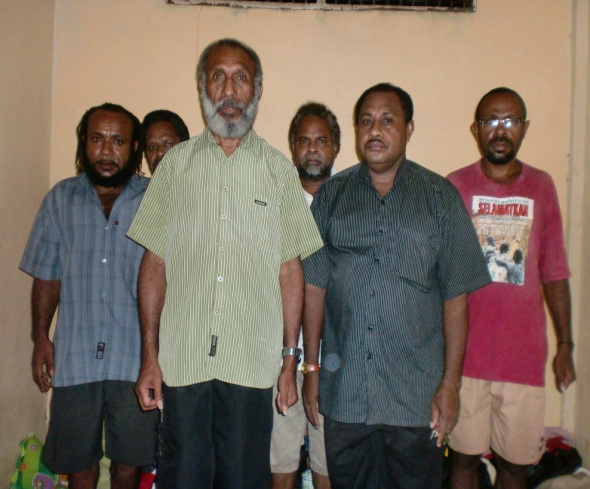Rallies to support Papuan leaders facing treason trials on Monday
January 28, 2012
by Nick Chesterfield at Westpapuamedia.info with sources
West Papua’s civil resistance movement is believed to be organising major demonstrations to support West Papuan leaders facing treason charges in Indonesia’s courts on Monday, January 30.
Indonesian prosecutors will begin proceedings in Jayapura in the treason trials for the leaders of the Third Papuan People’s Congress (KP3), which decalred independence from Jakarta on October 19 last year, after which Indonessian security forces stormed the venue. The President of the Federated Republic of West Papua Forkorus Yaboisembut, Prime Minister Edison Waromi, together with Congress organisers Selpius Bobii, Dominikus Sorabut, Agus Sananay and Gat Wenda all face a battery of charges stemming from their involvement in the Third Papuan Peoples Congress, held for only the third time since 1961.

Papuan leaders are standing infront; Forkorus Yaboisembut S.Pd, Edsison Waromi SH .behind Dominikus Surabut, Gad Wenda, Agus Senandy Kraar and Selpius Bobii (Photos: West Papua Media)
Five of the six are charged with treason under Article 106 of KUHP (the Indonesian Criminal Code), and have also been charged under Article 53 for incitement to acts of treason, and Article 55 which states that even attempting to committ an act (in this case treason), even if unproven is the same as committing the act. Gat Wenda is charged with carrying a concealed weapon. The use of these charges date back to the Dutch colonial times and were used extensively by the Suharto New Order regime to suppress nonviolent dissent.
Their trial will take place at Pengadilan Negeri Klas 1A (State Court 1A), according to a letter dated 17 January (reference 17/PEN.PID/2012/PN). The trial is due to start at 10:00am. The Hon. Jack Johanes Octovianus SH. MH. will be the presiding judge.
Indonesian police and soldiers stormed the Congress venue on October 19 after the independence declaration at the close of the Congress, killing at least 7 people, injuring hundreds and arresting as many as 800 participants. All but the six current detainees were eventually released, but ongoing crackdowns against Papuan nonviolent activists by security forces across Papua intensified in the weeks after the Congress, with several cases of arbitrary arrest and killings.
Papuan human rights activists have alleged, as Video footage of the attack clearly shows, Australian trained Detachment 88 anti-terror troops involved in the attack on unarmed congress participants. Six people were killed and over 300 were arrested.
All detainees were severely beaten by Indonesian police extensively in the weeks following the crackdown, with Yaboisembut sustaining multiple fractures including broken ribs and sternum, and was so badly tortured that he could not stand.
The Institute for Human Rights Study and Advocacy (Elsham) together with the Communion of Churches in Papua (PGGP) reported in said that at least 51 people had been tortured by members of the military and police during and after the Congress. Congress participants testified that they had been “beaten and kicked repeatedly by security forces both at the congress site and while being transported to police headquarters. Some participants said they were beaten at the police station.”
In mid December, when the Indonesian police finally charged the detainees with treason, their legal team rejected this unequivocally. As reported by Bintang Papua, well prior to the Congress the committee sent a letter of notification to the police requesting permission for the congress to be held, and had also sent a letter to the Minister for Legal, Political and Security Affairs Djoko Suyanto, requesting him to be the keynote speaker at the congress. Suyanto agreed and instructed the director-general of the ministry to open the congress, though he never attended.
‘How can this be said to be treason when there have been letters received from the police and the minister?,’ said the lawyers who stressed that all their clients had done was to express their opinions, rights guaranteed under Indonesian Law the Universal Declaration of Human Rights and the Covenant on Civil and Political Rights.
An SMS sent to West Papua Media from the KP3 committee has called for the people of Papua to guard the results of the Third Papuan Congress and to hold the Indonesian state to upholding the due process of law.
There is a high likelihood that the six will not receive a fair trial, according to human rights monitors and the lawyers for the six.
The Papuan detainees have requested international observers, including an Australian Government representative be present at the trial and their lawyers have advised that it is possible. The six are all peaceful protesters who were exercising their right to free speech, according to legal observers.
Demonstrations of prayers, live music and vigils are planned to be held outside the courthouse during the trials, according to West Papua Media stringers on the ground in Jayapura. The KP3 COmmittee have called for people to “maintain an escort for the trial that is peaceful and dignified” and to remain united in the face of security force provocations.
West Papua Media stringers also report that Indonesian security forces have mobilised sigificantly to prevent any “disruption” of the treason trials, expected to be a flashpoint for further crackdown by security forces on peaceful dissent. Significant deployment of military hardware is expected on Monday which may provoke an already tense atmosphere.
West Papua Media will naturally report on any developments as they happen




